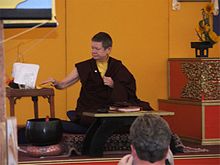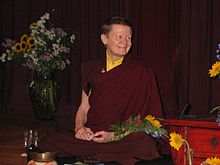- Pema Chödrön
-
Pema Chödrön 
Pema Chödrön at a talk on "No Time to Lose"Religion Vajrayana Buddhism Personal Born July 14, 1936
New York City, New York, United StatesSenior posting Title Bhikkhuni Pema Chödrön (born Deirdre Blomfield-Brown) is a notable American figure in Tibetan Buddhism. A disciple of Chögyam Trungpa Rinpoche, she is an ordained nun,[1] author, and teacher in the Shambhala Buddhist lineage which Trungpa founded.
A prolific author, she has conducted workshops, seminars, and meditation retreats in Europe, Australia, and throughout North America. She is resident and teacher of Gampo Abbey, a monastery in rural Cape Breton, Nova Scotia, Canada.[2]
Contents
History
Pema Chödrön was born in or around 1936 in New York City. She attended Miss Porters School in Farmington, Connecticut and graduated from the University of California, Berkeley. She worked as an elementary school teacher in California and New Mexico before her conversion to Buddhism.
Following a second divorce, Chödrön began to study with Lama Chime Rinpoche in the French Alps. She became a Buddhist nun in 1974 while studying with him in London.[3] She is a fully ordained bhikṣuṇī in a combination of the Mulasarvastivadin and Dharmaguptaka lineages of vinaya, having received full ordination in Hong Kong in 1981 at the behest of the sixteenth Karmapa. She has been instrumental in trying to reestablish full ordination for nuns in the Mulasarvastivadin order, to which all Tibetan Buddhist monastics have traditionally belonged; various conferences have been convened to study the matter.
Ani Pema first met Chögyam Trungpa Rinpoche in 1972, and at the urging of Chime Rinpoche, she took him as her root guru ("Ani" is a Tibetan honorific for a nun). She studied with him from 1974 until his death in 1987.[4][5] Trungpa Rinpoche's son, Sakyong Mipham Rinpoche, appointed Chödrön an acharya (senior teacher) shortly after assuming leadership of his father's Shambhala lineage in 1992.
Trungpa Rinpoche appointed Ani Pema director of the Boulder Shambhala Center (then Boulder Dharmadhatu) in Colorado in the early 1980s.[6] It was during this period that she became ill with chronic fatigue syndrome. In 1984, Ani Pema moved to Gampo Abbey and became its director in 1986.[2] There, she published her first two books. Her health gradually improved, she claims, with the help of a homeopath and careful attention to diet.
In late 2005, Pema Chödrön published No Time to Lose, a commentary on Shantideva's Guide to the Bodhisattva's Way of Life. She published Practicing Peace in Times of War in 2006.
Present
Pema Chödrön is a member of The Committee of Western Bhikshunis which was formed in 2005.[7] She is currently studying with the Venerable Lama Dzigar Kongtrul Rinpoche, and spends seven months of each year in solitary retreat under his direction in Crestone, Colorado.[8]
Chödrön continues to teach the traditional Yarne (Tib. rainy season; Sanskrit: Vassāvāsa[9]) retreat for monastics at Gampo Abbey each winter. In recent years, she has spent the summers teaching on the Guide to the Bodhisattva's Way of Life in Berkeley. A central theme of her teachings is shenpa,[10][11][12] the Tibetan word for "attachment", which she interprets as anger, low self-esteem, or addiction in response to an insult by another person.[11]
Teachings
A central theme of Pema Chödrön's teachings is the Tibetan word shenpa,[10] or how we get hooked.
Somebody says a mean word to you and then something in you tightens — that's the shenpa. Then it starts to spiral into low self-esteem, or blaming them, or anger at them, denigrating yourself. And maybe if you have strong addictions, you just go right for your addiction to cover over the bad feeling that arose when that person said that mean word to you. This is a mean word that gets you, hooks you. Another mean word may not affect you but we're talking about where it touches that sore place — that's a shenpa. Someone criticizes you — they criticize your work, they criticize your appearance, they criticize your child — and, shenpa: almost co-arising.[13]Personal life
Pema has two children and three grandchildren, all of whom live in the San Francisco Bay Area, except her granddaughter who attends Naropa University in Boulder, Colorado.[14]
Bibliography
- Books
- The Wisdom of No Escape And The Path of Loving-Kindness. Shambhala Publications, 1991. ISBN 1-57062-872-6
- Start Where You Are: A Guide to Compassionate Living. Shambhala Publications, 1994. ISBN 0-87773-880-7
- Awakening Loving-Kindness(abridged version of The Wisdom of No Escape). Shambhala Publications, 1996. ISBN 1-570-62259-0
- When Things Fall Apart: Heart Advice for Difficult Times. Element Books, 1996. ISBN 1-570-62969-2
- Tonglen: The Path of Transformation. Vajradhatu Publications, 2001. ISBN 1-570-62409-7
- The Places that Scare You: A Guide to Fearlessness in Difficult Times Shambhala Publications, 2002. ISBN 1570624097
- Comfortable with Uncertainty: 108 Teachings on Cultivating Fearlessness and Compassion. Shambhala Publications, 2003. ISBN 1-59030-078-5
- No Time to Lose: A Timely Guide to the Way of the Bodhisattva. Shambhala Publications, 2005. ISBN 1-590-30135-8
- Practicing Peace in Times of War: A Buddhist Perspective Shambhala Publications, September 2006. ISBN 1-590-30401-2
- Taking the Leap: Freeing Ourselves From Old Habits and Fears. Shambhala Publications, 2010 Reprint. ISBN 1590308433
- Audio
- Unconditional Confidence: Instructions for Meeting Any Experience with Trust and Courage. Sounds True, Inc, 2009. ISBN 1591797462
- Getting Unstuck: Breaking Your Habitual Patterns & Encountering Naked Reality. Sounds True, Inc, 2006. ISBN 159179238X
- Awakening Compassion: Meditation Practice For Difficult Times. Sounds True, Inc, 1995. ISBN 1564553140
- Noble Heart: A Self-Guided Retreat on Befriending Your Obstacles. Sounds True, Inc, 1998. ISBN 1564555763
- Good Medicine: How to Turn Pain into Compassion With Tonglen Meditation. Sounds True, Inc, 2001. ISBN 1564558460.
- Alice Walker and Pema Chōdrōn in Conversation: On the Meaning of Suffering and the Mystery of Joy. Sounds True, Inc, 1999. ISBN 1564556700
- Pure Meditation: The Tibetan Buddhist Practice of Inner Peace. Sounds True, Inc, 2000. ISBN 1564558118
- Seven Points of Mind Training: Shenpa Teachings. 2006.
- Don't Bite the Hook: Finding Freedom from Anger, Resentment, and Other Destructive Emotions. Shambhala Audio, 2007. ISBN 1590304349
- How to Meditate: A Practical Guide to Making Friends with Your Mind. Sounds True, Inc, 2007. ISBN 1591797942
- Compilations
- The Compassion Box - includes Start Where You Are, a set of 59 slogan cards with brief commentaries, and a CD of tonglen meditation instruction. Shambhala Publications, 2003. ISBN 1590300750
References
- ^ Ani Pema Chödrön
- ^ a b Susan Neunzig Cahill (1996). Wise Women: Over Two Thousand Years of Spiritual Writing by Women. W. W. Norton & Company. pp. 377. ISBN 0393039463.
- ^ Fabrice Midal (2005). Recalling Chögyam Trungpa. Shambhala Publications. pp. 476. ISBN 1-59030-207-9.
- ^ Sandy Boucher (1993). Turning the Wheel: American Women Creating the New Buddhism. Beacon Press. pp. 93–97. ISBN 0807073059.
- ^ James William Coleman (2001). The New Buddhism: The Western Transformation of an Ancient Tradition. Oxford University Press. pp. 150. ISBN 0195152417.
- ^ Boucher (1993) pp. 96-97
- ^ see information on her Homepage
- ^ Website of Kongtrul Rinpoche
- ^ Buddhist Monks And Monasteries Of India: Their History And Contribution To Indian Culture. George Allen and Unwin Ltd, London 1962. pg 54
- ^ a b Bill Moyers and Pema Chödrön . August 4, 2006
- ^ a b The Shenpa Syndrome
- ^ How We Get Hooked and How We Get Unhooked
- ^ The Shenpa syndrome: Learning to stay
- ^ "Biography of Acharya Ani Pema Chödrön". Gampo Abbey. http://www.gampoabbey.org/ane_pema/. Retrieved 2006-12-29.
External links
- Pema Chödrön's web site
- List of Pema Chödrön's articles on Shambhalasun.com
- The Pema Chödrön Foundation's web site
- Works by or about Pema Chödrön in libraries (WorldCat catalog)
- Video Interview with Pema Chödrön by Bill Moyers
- Pema Chödrön and Dzigar Kongtrül: Let’s Be Honest A discussion led by Elizabeth Namgyel
Buddhism Modern Dharma / Dhamma writers (1875 to date) Buddhist - Rahul Sankrityayan
- B. R. Ambedkar
- S. N. Goenka
- Stephen Batchelor
- Lokesh Chandra
- Chogyam Trungpa Rinpoche
- Pema Chödrön
- Edward Conze
- Lama Surya Das
- Alexandra David-Néel
- Henepola Gunaratana
- Kelsang Gyatso
- Dalai Lama
- Thrangu Rinpoche
- Walpola Rahula
- C. A. F. Rhys Davids
- T. W. Rhys Davids
- Seongcheol
- Sogyal Rinpoche
- Chogyal Namkhai Norbu
- Robert Thurman
- Richard Gombrich
- Chah Subhatto
- Nanavira Thera
- Thanissaro Bhikkhu
- Bhikkhu Bodhi
- Nyanaponika Thera
- Jack Kornfield
- Gil Fronsdal
- Seung Sahn
- Kitaro Nishida
- Khyentse Norbu
- D. T. Suzuki
- Paul Reps
- Scott Shaw
- Thich Nhat Hanh
- Yin Shun
- Hsuan Hua
- Hsing Yun
- Nan Huai-Chin
- Philip Kapleau
- Shunryu Suzuki
- Taizan Maezumi
- Han Yong-un
- Ole Nydahl
- Matthieu Ricard
- Lama Anagarika Govinda
- Daisaku Ikeda
- Shohaku Okumura
- Dainin Katagiri
- Reb Anderson
Hindu Jain Sikh - Bhai Vir Singh
- Harjot Oberoi
- G. B. Singh
- G. S. Talib
- Khushwant Singh
- Sahib Singh
- Karam Singh
- Bhai Kahn Singh
- Harjinder Singh Dilgeer
- Jaswant Neki
- Randhir Singh
- Bhagat Puran Singh
Syncretic, etc. Categories:- 1936 births
- 20th-century Lamas
- American Buddhist nuns
- American spiritual writers
- Buddhist philosophers
- Buddhist nuns
- Converts to Buddhism
- Living people
- People with chronic fatigue syndrome
- Buddhist writers
- People from New York City
- Tibetan Buddhist teachers
- Tibetan Buddhists from the United States
- University of California, Berkeley alumni
Wikimedia Foundation. 2010.

